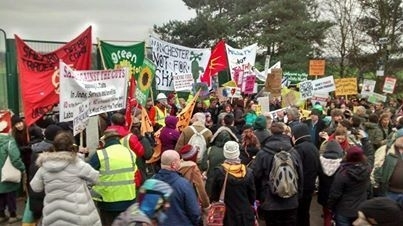
A union has pledged to represent workers if the shale gas industry develops, stressing the importance of securing decent pay and conditions in the fledgling sector.
The GMB said it should be ready to organise workers if the so-called fracking process ever gets started.
National officer Gary Smith told the union’s annual conference in Dublin it would be wrong to oppose fracking, as other unions have done.
He said: “Jumping on bandwagons is easy, but doing the easy thing does not mean you are doing the right thing. It would be easy to come out against fracking, but it would be wrong for the union, and for the country.”
The GMB, which represents gas workers, will commission a special report to analyse the role of shale gas in meeting the country’s future requirements.
Lengthy debate at the conference led to support for moving forward with plans for the GMB to recruit and organise workers likely to be employed in the shale gas industry.
Mr Smith told the 500 delegates that gas will remain crucially important in meeting Britain’s future energy needs for many decades to come.
“The issue for Britain isn’t whether we will use gas or not. We will. The real issue is where we will get our gas from, and who should take the moral responsibility for extracting and supplying the gas we use.
“As both the International Panel on Climate Change (IPCC) and the independent UK Committee on Climate Change (CCC) have recognised, gas has an important part to play in Britain reducing our carbon emissions.
“The future role of gas could be even more crucial in lowering CO2 emissions in Britain, through the development of micro combined heat and power units to produce heat and electricity for homes. Fuel cells which have zero carbon emissions will have a huge role to play in the future, and these will need gas too.
“Our energy intensive industries need access to affordable, secure energy supplies. They need the certainty that Britain’s energy mix will meet their needs. They, like Britain’s households, need gas to be part of that energy mix.
“The debate about fracking must be based upon complete honesty about the economic realities of gas.”
A statement from the GMB executive questioned whether it was acceptable to import gas from countries where the safety, environmental and regulatory standards were lower than in Britain.
“Should gas be imported from states where there is no civil society, no right to protest and where workers are denied basic trade union rights?
“Is it kinder to the environment for gas to be transported for thousands of miles across continents and oceans before we use it here in Britain?
“If exploratory drilling reveals a plentiful supply of UK shale gas reserves, is it not a moral duty for Britain to take responsibility for providing for our own gas needs from those supplies, rather than importing gas from elsewhere?” said the statement.
Some delegates highlighted the possible dangers of fracking, such as the impact on water supplies, and earth tremors, saying there was no evidence the process of hydraulic fracturing was safe.
The Government was accused of being “gung ho” about fracking and of not publishing adequate information to the public.
Mr Smith added: “If onshore fracking for shale gas does develop from its current exploratory status into an industry which will be supplying a significant proportion of the gas that Britain needs, GMB will need every ounce of our organising expertise and commitment to safeguard the workers in the industry.
“Anything less than protecting these workers from exploitation in a fledgling industry, as we did with gasworkers 126 years ago, would be a betrayal of our history and moral responsibility.”
The GMB later announced it had signed an agreement with onshore oil and gas group UKOOG on a charter for shale gas covering safety and skills.
A safety forum will be set up and the union will have a seat on the advisory council of a new National College.
Ken Cronin, chief executive of UKOOG, said: “Natural gas from shale has the potential to generate many thousands of highly-skilled well-paid jobs. It is essential for the economic well-being and the energy security of the UK that we get on with exploration to determine the extent of the gas resources we have in this country.”
